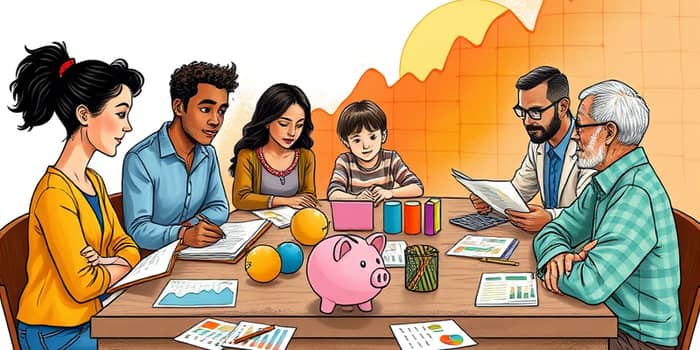In today’s complex economic landscape, the ability to navigate money matters has never been more vital. Financial literacy equips people with the knowledge and skills to shape their destinies, break cycles of debt, and build lasting security. This article explores how understanding money transforms lives and communities, backed by real-world data and inspiring success stories.
The Foundations of Financial Literacy
At its core, financial literacy is the mastery of concepts, tools, and risks around personal finance. With understanding of financial fundamentals, individuals gain confidence in every money decision, from everyday budgeting to long-term investing.
Key areas include:
- Budgeting: Controlling expenses, tracking spending, and aligning income with outlays.
- Debt management: Distinguishing good vs. bad debt, building credit, and eliminating liabilities.
- Saving: Creating emergency funds, planning for major purchases, and funding education goals.
- Investing: Balancing risk and reward, diversification, and participation in asset markets.
- Retirement planning: Harnessing compound interest, employer plans, and setting long-term objectives.
- Insurance and loans: Comparing products, understanding terms, and protecting against unexpected events.
Why It Matters: The Benefits and Broader Impact
Empirical evidence shows that financially literate individuals enjoy superior outcomes across multiple fronts. By making informed and effective decisions, they become 72% more likely to save and 50% more likely to comparison-shop. Each additional correct answer on a literacy quiz raises retirement planning probability by 3–10 percentage points, depending on the region.
Consider these global improvements:
On a societal level, stronger financial skills lead to broad-based financial inclusion and stability. Regions investing in early and sustained education see higher credit scores, reduced loan defaults, and more vibrant economies. In Georgia, USA, mandated financial courses lifted student credit scores by 7, 18, and 27 points across successive cohorts.
Evidence and Effectiveness of Financial Literacy Education
Meta-analytic research spanning 160,000+ participants in 33 countries affirms that financial education produces large gains in knowledge and medium-sized behavior changes. However, not all programs are equal. Sustained engagement and follow-ups prove essential for lasting results.
Key findings include:
- One-time seminars generate immediate but short-lived knowledge spikes.
- Multi-session workshops with periodic refreshers boost retirement savings by nearly 10%.
- Low-cost interventions deliver high long-term societal returns, making them ideal for broad deployment.
Programs tailored to adults around age 40, when retirement decisions are most pressing, show particularly strong behavior shifts. Workplace initiatives that integrate digital tools and mentorship outperform passive classroom lectures.
Barriers: Who Is Being Left Behind?
Despite clear benefits, persistent gaps threaten to widen inequality. Students from disadvantaged backgrounds underperform by up to 12% compared to peers. Girls report 52% confidence in online transactions versus 61% for boys. Regions lacking universal curricula leave many without basic money management tools.
- Socio-economic: Family income explains a significant share of literacy variation.
- Gender: Confidence and access disparities undermine girls’ financial agency.
- Geography: Rural and underserved areas often lack qualified instructors and resources.
- Family influence: Students discussing money at home monthly are 68% more literate.
Unless these barriers are explicitly addressed in program design, short-term gains will fail to translate into broad societal progress.
Global Initiatives and Policy Context
Over the past decade, more than five billion people in 60+ countries have been targeted by national financial education strategies. Organizations like the OECD and G20 advocate for mandatory curriculum integration and cross-sector partnerships.
Examples of success include India’s Digital Money Literacy campaigns, China’s community-based workshops, and Brazil’s schoolyard financial olympics. While the pace and quality of implementation vary, the global consensus is clear: equipping citizens with money skills is fundamental to economic resilience.
Best Practices in Financial Education
Transformative programs share several characteristics:
- Interactive learning with real-world simulations and role-play.
- Inclusive content that addresses cultural norms and systemic biases.
- Regular reinforcement through digital nudges, peer groups, and parental engagement.
By combining these elements, educators can empower individuals to thrive economically and create a multiplier effect as knowledge spreads within communities. Public-private partnerships leveraging technology platforms have proven especially potent in reaching remote and underserved populations.
Empowering Your Economic Future: Take Action
Whether you are a student, parent, teacher, or policymaker, you can play a role in advancing financial literacy. Here are concrete steps to ignite positive change:
- Individuals: Commit to ongoing learning—use reputable online courses, budgeting apps, and invest small amounts to gain practical experience.
- Educators: Integrate hands-on activities, such as mock investing competitions, and involve families in open money discussions.
- Employers: Offer workplace seminars, match retirement contributions, and provide one-on-one coaching sessions.
- Policymakers: Mandate personal finance in school curricula, fund community workshops, and monitor program effectiveness through data-driven evaluations.
By taking these actions today, you spark a ripple effect that lifts individuals, strengthens families, and fortifies entire economies. The journey to financial confidence begins with a single step—embrace it, share your knowledge, and together we will build a future where every person can thrive with dignity and security.
References
- https://www.oncourselearning.com/resources/benefits-financial-literacy
- https://pmc.ncbi.nlm.nih.gov/articles/PMC5445906/
- https://www.oecd.org/en/blogs/2025/03/the-role-of-financial-literacy.html
- https://www.brookings.edu/articles/financial-literacy-what-works-how-could-it-be-more-effective/
- https://www.nea.org/resource-library/financial-literacy-economic-inequality
- https://pubmed.ncbi.nlm.nih.gov/34617486/










